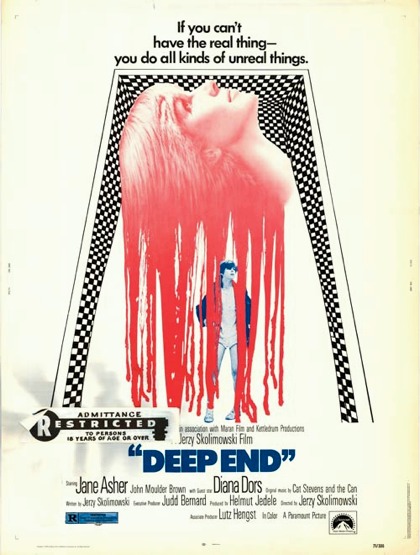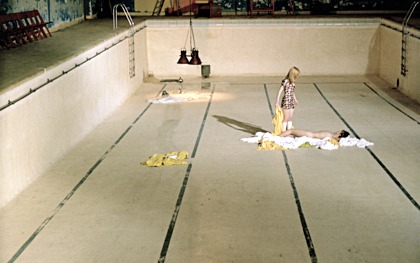Review / From the archives
Deep End

Jerzy Skolimowski’s study of obsession blends poetry and farce with surrealist abandon, as wrote Nigel Andrews in his original Monthly Film Bulletin review
Deep End
West Germany / UK 1970
Director: Jerzy Skolimowski
With Jane Asher, John Moulder-Brown, Karl-Michael Vogler, Chris Sandford, Diana Dors
91 mins | Cert 15
Review
Spoiler alert: this review gives away a major plot twist.
Skolimowski’s assertion that he never thinks of symbols or interpretations when he makes a film is a useful caution to anyone tempted to see the municipal baths in Deep End as a microcosm of the sexual world; the bureaucratic segregation of the sexes, the exhibitionism of the pool contrasted with the fantasising of the cubicles. The logic of Skolimowski’s films is poetic, creating overtones not through an organised equation of image and meaning but through surrealist metaphors which erupt to spark actuality into life. Skolimowski allows his characters’ dreams total freedom, and within that subjective arena anything can happen. Previous Skolimowski heroes have been galvanised into virtual lunacy by the strength of their ruling passions – boxing, cars, military heroics – and Mike in Deep End is the latest in that line, an adolescent ex-schoolboy gradually transformed from victim to pursuer in a world of sexual opportunism, but remaining throughout curiously innocent.
The baths serve essentially as a breeding ground for such dreams – “When they’re in there, they’re all supermen,” says Jane Asher washing the boasting graffiti off the cubicle walls; and Diana Dors’ orgasmic football soliloquy, clasping Mike to her bosom as she dreams of George Best (“It’s always tackle, dribble, dribble, SHOOT!”) is an object lesson in the subordination of reality to ruling passion. Mike’s exaggerated fascination with sex is nourished by its ever-present commercial exploitation – the sex film he sees while spying on Susan, and the advertising cut-out of a stripper resembling Susan which he steals and on which he later floats in naked adoration back at the pool.
Though its structure is piecemeal, Deep End has some striking recurring images. The film’s sporadic underwater shots accompany Mike’s descent into fantasy – visions of a naked Susan, progressing from the cut-out to the closing shot of Mike’s necrophiliac embrace, blood issuing from the dead girl’s neck. The film begins and ends with red liquid spilling across the frame, an image possibly of the spread of irrational passion that the film portrays – and making sense, as a visual harmony, of the hand that mysteriously paints a section of the corridor wall red in the background of a cantankerous scene between Susan and the cashier, or of the pots of red paint that overturn spectacularly during Mike and Susan’s quarrel. Jane Asher’s red hair, and the isolated shot of her framed against an orange and red section of wall in the baths, thus identify her as the film’s temptress.

On a broader level, Deep End sets up innumerable correspondences with the implications of its title – deep end and shallow end; Mike’s progress from callow schoolboy to virtual sex murderer; the visual contrast between the shabby, lifeless streets of London by day (actually Munich) and the corrupt glitter of the nightclubs. Mike’s determination to fathom those depths leads finally to such a lunatic single-mindedness that even Susan’s death evokes no emotion stronger than gratitude at this last gift of physical submission. The scene’s extraordinary mixture of poetry and black farce is the logical culmination to a film that has alternated both moods with prodigious rapidity, creating a study in the growth of obsession that is both funny and frighteningly exact.
Nigel Andrews, Monthly Film Bulletin, April 1971
‘Deep End’ is re-released from 6 May 2011 at the BFI Southbank and venues around the UK
See also
Essential Killing reviewed by Tony Rayns (April 2011)
Lost and forgotten: British cinema of the 70s: Mark Sinker on a selection of ‘forgotten’ films from Britain’s watershed of shifting cultures and identities (July 2010)
